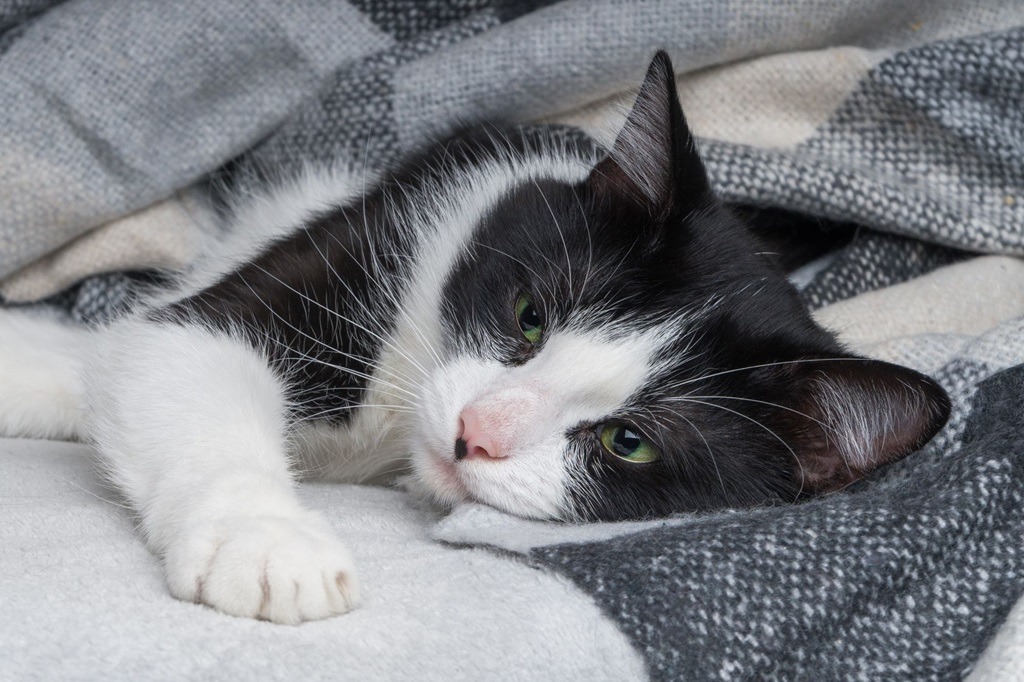As a cat owner, you want to make sure your furry friend is as healthy and happy as can be. But cats are notorious for hiding illnesses, so it can be tricky to know if your cat is under the weather. In this guide, I will tell you how to tell if my cat is sick. Also, I will go over the signs and symptoms of common feline illnesses when you should take your cat to the vet, and how to care for a sick kitty at home.
Observing Changes in Behavior and Activity Level
Cats experiencing illness often exhibit behavioral changes. Pay close attention if your cat displays:
Decreased Activity
Healthy cats are playful and energetic. If your once-active kitty starts sleeping much more than usual or shows no interest in play, it could signal an underlying issue.
Hiding
It’s normal for cats to retreat to quiet hiding spots occasionally. But if your social butterfly starts isolating themselves frequently, it may mean they don’t feel well.
Loss of appetite
Skipping the occasional meal is normal, but a decreased appetite over several days could indicate illness. This is especially concerning for senior cats.
Neglecting Grooming
Cats are fastidious groomers, so a messy, unkempt coat can point to health problems. Your cat may also excessively groom one area, signaling pain or skin irritation.
Aggression or Irritability
While pain and illness can make cats grouchy, take note if your mild-mannered tabby becomes inexplicably aggressive. Drastic personality changes warrant a trip to the vet.
Excessive Vocalization
Some cats grow more vocal when distressed. Take note if your quiet cat starts meowing or yowling excessively.
Changes in Litter Box Habits
Urinary issues, constipation, and other conditions can cause cats to strain or miss the litter box. A house-trained cat is suddenly eliminating something outside their box warrants an exam.
Recognizing Signs of Illness in Cats
In addition to behavior changes, keep an eye out for these physical symptoms:
Weight Loss
Sudden weight loss in cats can signal a major issue like diabetes, hyperthyroidism, cancer, or gastrointestinal disease. Have your vet determine the cause.
Poor Coat Condition
A dulled, brittle coat can indicate your cat isn’t feeling well. Parasites, allergies, and nutritional deficiencies can also affect coat health.
Increased Thirst and Urination
Drinking and peeing more than usual are classic signs of multiple illnesses in cats, including kidney disease and diabetes. Monitor litter box habits.
Squinting, Discharge, or Redness in the Eyes
Feline upper respiratory infections commonly cause eye symptoms. Left untreated, they can progress to more serious issues.
Changes in Breathing
Rapid breathing, coughing, wheezing, and labored breathing may mean respiratory troubles. Severe cases require prompt veterinary care.
Oral Issues
Bad breath, drooling, and difficulty eating can indicate dental disease, mouth ulcers, or oral tumors in cats.
Changes in Activity Level
Lethargy, moving stiffly, and reluctance to jump up are often signs of arthritis and other joint issues in senior cats.
Skin Changes
Irritated, itchy skin may indicate parasites, allergies, or ringworm fungus. Hair loss, scabs, and lesions warrant inspection.
Vomiting or diarrhea
Upset stomachs happen, but recurrent vomiting or bloody diarrhea can reflect inflammatory bowel disease, parasites, viruses, food allergies, and other gastrointestinal conditions in cats.
Lumps and Bumps
New lumps need diagnostic tests to rule out tumors. Swollen lymph nodes may indicate an infection. Enlarged abdomens can reflect fluid buildup and organ issues.
Caring for a Sick Cat at Home
Feline illnesses often require prescription medications, but you can support your sick kitty at home. Here’s how:
Keep them eating
Appetite stimulants from your vet can help. Offer smelly foods like tuna or clam juice. Hand-feed small portions frequently. Warming food releases aromas. Blended or pureed meals are easier to digest.
Encourage Drinking
Dehydration makes cats feel worse. Provide fresh, clean water in multiple places around the home. Add tuna juice or low-sodium chicken broth to entice drinking. Give subcutaneous fluids if prescribed.
Help Them Relax
Let your cat rest in a comfortable, peaceful room away from other pets and noise. Place food, water, and litter nearby. Offer your favorite blankets or toys for comfort.
Keep the Litter Box Accessible
Don’t move litter boxes unless necessary. Scoop frequently to help sick cats use the box comfortably. Add extra boxes nearby if needed.
Administer Medications
Get tips from your vet on giving pills and liquid medications. Pilling pockets make giving tablets easier. Set reminders and follow instructions precisely.
Monitor Appetite and Symptoms
Weigh your cat weekly if weight is a concern. Track symptoms, like vomiting frequency. Update your vet regularly on progress.
Limit Stress
Minimize handling and interventions that upset your cat. Diffuse calming cat pheromones in the home. Discuss anti-anxiety medication if stress is prolonging recovery.
Allow restful sleep
Give your cat space and be quiet when sleeping. Cover carriers and beds with blankets to help cats feel secure.
With attentive home nursing care and your vet’s treatment plan, most cats can recover quickly from illness!
Knowing When to Take Your Cat to the Vet
Schedule an appointment if you observe any of the following in your cat:
- Not eating for more than 1-2 days
- Repeated vomiting or diarrhea over 24 hours
- Difficulty breathing
- Weight loss exceeding 1 lb per month
- Sudden collapse or inability to use hind legs
- Crying or whining from pain
- Inability to urinate for over 24 hours
- Seizures
- Bleeding from the nostrils, mouth, rectum, or urine
- Straining or crying when using the litter box
- Lethargy over 48 hours
- Substantial increase in thirst or urination
- New lumps, lesions, or swelling
- Persistent coughing or sneezing over 2–3 days
For less severe symptoms, monitor your cat closely for 2–3 days. Make an appointment if symptoms persist, worsen, or interfere with your cat’s normal activities. When in doubt, call your vet for guidance.
In Conclusion: Keep a Watchful Eye on Your Cat’s Health
Cats have subtle ways of signaling they’re under the weather. Learn your cat’s normal routine and behaviors so you can recognize worrisome changes. Catching illness early makes treatment easier. Don’t hesitate to call your vet if something seems off with your feline friend. With attentive care from you and your veterinarian, your cat can remain happy and healthy for many years to come!
Frequently Asked Questions
How can I get my cat to take medication?
Try mixing liquid medication into a small amount of tuna juice, chicken broth, or cream cheese. For pills, use a pill pocket treat or pill “gun” device. Or gently pry open your cat’s mouth by gripping it behind the rear molars and dropping the pill far back on the tongue.
What should I feed a sick cat who has no appetite?
Try warming canned food to bring out the aroma. Hand-feed tiny morsel-sized bits frequently. Use a syringe to slowly feed nutrient gels or recovery foods. Ask your vet about appetite-stimulant medications.
How do I know if my lethargic cat needs an emergency vet?
Seek emergency care for breathing difficulty, seizures, inability to walk, continuous vomiting or diarrhea, crying in pain, or an inability to urinate for 12+ hours. For mild lethargy under 48 hours, call your regular vet.
My cat has diarrhea. When should I worry?
Mild diarrhea can resolve on its own within 24 hours. But seek veterinary attention if it continues for more than 1-2 days, contains blood or mucus, or is accompanied by vomiting, anorexia, lethargy, or fever.
How do I clean up the vomit and diarrhea from my sick cat?
For hard surfaces, wipe up messes immediately with paper towels. Then use a pet odor neutralizer spray. For carpets and bedding, blot promptly with rags before rinsing with cool water and pet carpet cleaner.








